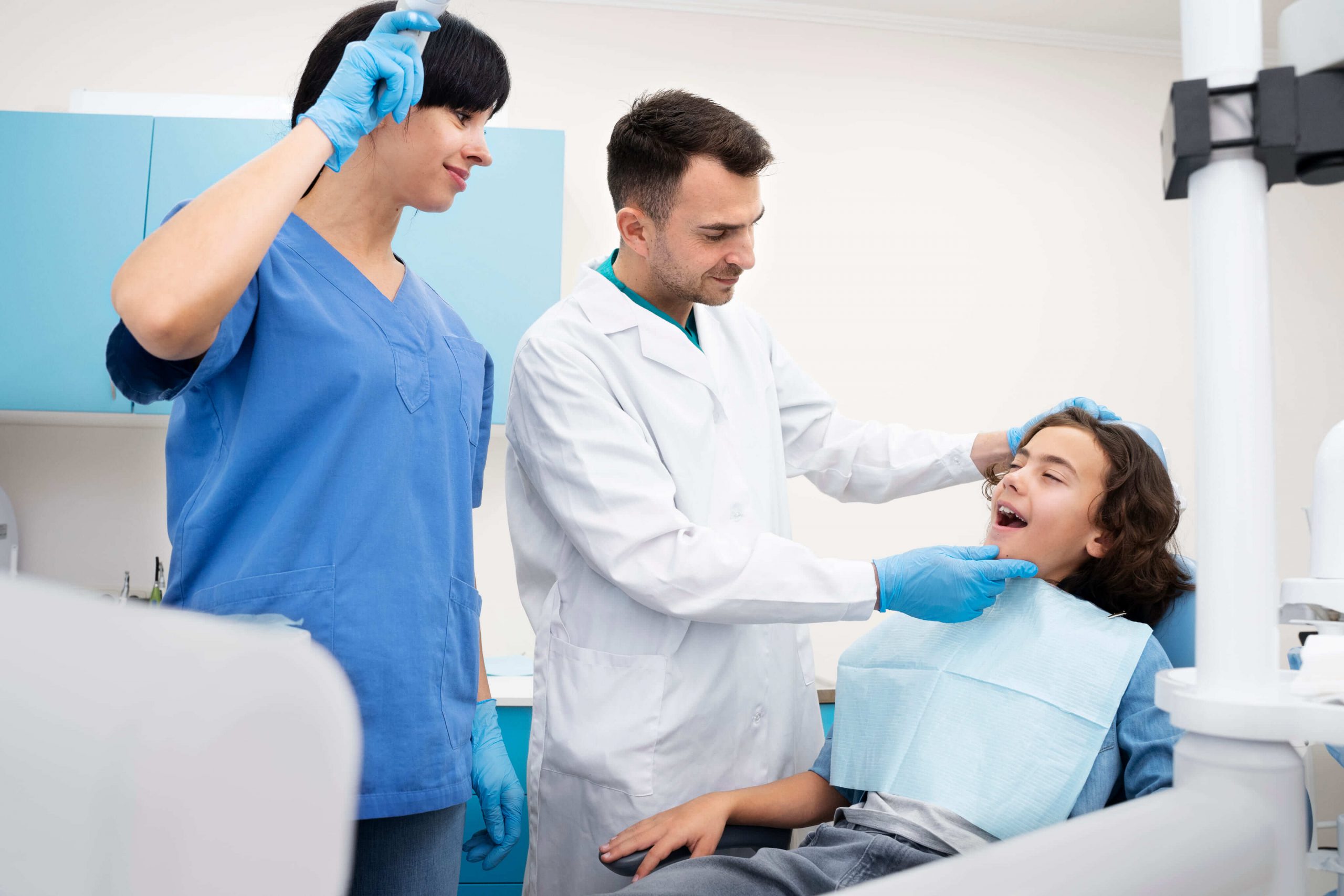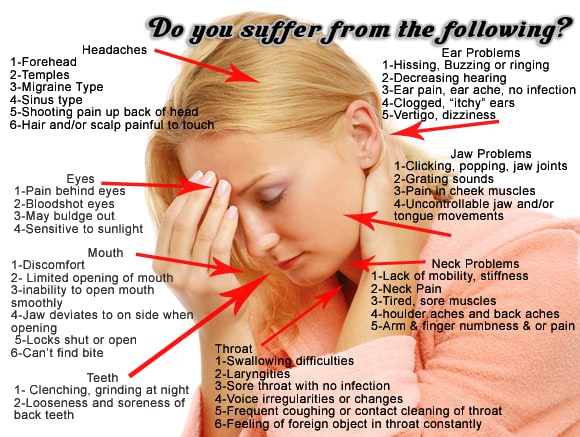
Can Temporomandibular Joint Dysfunction be Cured?
TMJ disorder is definitely treatable if not completely curable. Management of TMJ disease lessens pain and discomfort and prevents it from progressing to the worse condition. DNA appliance therapy is one example of treatment that can cure TMD by treating underlying cause of the problem. TMJ symptoms are most often caused by a condition caused by small jaw structure and night time airway issues. How to stop teeth clenching and grinding?

tmj causes
Small jaw structure has all kinds of negative consequences:
- Less space in the mouth and inadequate room for tongue function and proper breathing patterns.
- Less space for teeth to fit. There is teeth crowding and bad bites. Often people with small jaw structure have been treated with braces and other treatments that can make TMJ problems worse.
- Small jaw structure does not allow a balanced bite. The biomechanics of the bite are worse in these cases.
What are the corrective treatments for TMJ?
Contact Us for a no cost consultation
Why does TMJ Cause Pain for so Many People?
What is the best way to Manage TMJ disorder?
Management of TMJ disorder usually depends upon the cause of its occurrence. Treatment options for TMJ disease are diverse as there are so many causes of TMJ pain. These involve from self management procedures ranging from surgery to various TMJ and orthodontic expander appliances.
Various treatments are:
- Counseling and education of patients (cognitive behavioral therapy) which usually involves reassurance of the condition and telling them about the cause behind it. Your TMJ dentist will tell you about it in detail and will guide you towards the anticipated outcomes as well. Your confidence in treatment will be established based on reality,
- Habits which can damage TMJ and aggravate the disorder will be reversed and proper use of jaws during chewing, biting and eating will be guided and encouraged for future benefit,
- Moist heat pads and cold packs can be applied on painful muscles as part of thermotherapy,
- Massaging painful muscles of face which are used in chewing and biting food,
- Reduced mouth opening will be increased through stretching exercises through the use of multiple tongue depressors and sticks placed between teeth several times daily,
- Co-ordination and mobilization exercises will be taught to you by the TMJ specialist which will help in achieved controlled jaw movements,
- Physiotherapy should be started as soon as possible. It will provide best results in early course of treatment,
- Soft stabilization splints are provided for use within the mouth,
- Trans-electric nerve stimulation (TENS) relaxes jaw muscles and reduces pain through the use of electric current,
- Bite correction,
- Botox injections can be helpful in some cases of TMJ pain,
- Different types of stress reducing drugs help in treating TMJ pain such as Non steroidal anti-inflammatory drugs (NSAIDs), Tri-cyclic anti-depressants (TCAs), anxiolytics, anti-epileptics and cortico-steroids, muscle relaxants,
- Surgical intervention is usually avoided at all costs as conservative and symptomatic treatments usually suffice and gives excellent results,
- Whenever surgical treatment is deemed necessary by the TMJ expert, it is usually performed in the least invasive manner in the form of arthrocentesis and arthroscopy.
Which lifestyle changes and precautions would the TMJ specialist advises for prevention of TMJ pain?
- Avoid biting hard nuts and crunchy foods,
- Sticky foods can aggravate TMJ pain,
- Take soft diet,
- Reducing stress in daily life,
- Avoid gum chewing,
- Avoid sleeping on the side with TMJ pain,
- Avoid listening to phone with the cradle put on ear on the affected side,
- Eat food in smaller pieces,
- Refrain from yawning with wide open mouth.
Relaxation exercises help in the management of TMJ pain?
- Provide strength to muscles of jaws,
- Stretch jaw muscles for providing maximum relief and benefit,
- Increased mobility of jaws,
- Relaxed jaw muscles,
- Reduction in clicking of jaws,
- Increased opening of locked jaws,
- Help in achieving quick healing of affected jaws.
Is it possible that TMJ pain can go away on its own?
TMJ pain is among the common problems faced by students going for university and college examinations. Anticipated stress at work can cause throbbing pain and discomfort in your jaws and will result in sleepless nights. People lose confidence at work and are unable to perform their duties. It may result in grinding of teeth and sore face muscles. Simple painkillers and muscle relaxants can relieve the symptoms for sometime but the pain and discomfort comes back in no time. It is essential to consult your TMJ specialist for early diagnosis and complete management of TMJ pain disorders.
What are the major symptoms of TMJ pain disorder?
- Difficulty in opening your mouth due to locking of jaws when you wake up from sleep,
- Soreness of mouth in the morning,
- Tense jaws,
- Clenching and grinding of teeth known as bruxism,
- Limited opening of mouth and jaws
- Pain on movement of jaws i.e. both upside down and sideways movement,
- Wear of teeth,
- Tooth pain,
- Cracked teeth in severe cases,
- Previous history of multiple dental treatments such as root canal treatments, dental implants, dental fillings, dental bridges and crowns,
- Receding gums,
- Loss of bone around teeth,
- Difficulty of breathing during night as the tongue falls back and blocks airway (sleep apnea),
- Pain and discomfort on chewing and biting food,
- Severe pain within and around your ears (earache),
- Severe pain and discomfort in your temple area, behind eyes and back of head,
- Temporary loss of vision due to stress,
- Flu and sinus irritation,
- Chipping and cracking of teeth,
- Pain and discomfort in shoulders, neck, head and back,
- Problems in bite between upper and lower teeth,
- Loss of appetite.
TMJ pain can go away on its own and is of temporary nature if its due to a specific stimulus. It occurs during examinations and relieves soon after. However, TMJ pain is of recurring nature. However, TMJ discomfort due to injuries or some other permanent cause does not go away and needs complete treatment as advised by the TMJ specialist.
Can Acupuncture be used for treating TMJ disorder?
Yes. It may be of benefit to TMJ diseases associated with facial pain but the evidence related to this therapy is not conclusive yet. It may become established in future.

 (301) 421 1996
(301) 421 1996 burtonsvillesmiles@gmail.com
burtonsvillesmiles@gmail.com